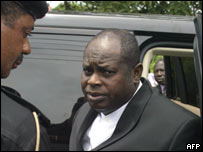


Posted by AP News on



The governor of an oil-rich Nigerian state has fled the UK, where he was charged with laundering £1.8m ($3.2m) found in cash and bank accounts. Diepreye Alamieyeseigha is back at work in his home state of Bayelsa, officials say. He was granted bail in September, on condition he stayed in the UK.
The governor of an oil-rich Nigerian state has fled the UK, where he was charged with laundering £1.8m ($3.2m) found in cash and bank accounts.
Diepreye Alamieyeseigha is back at work in his home state of Bayelsa, officials say. He was granted bail in September, on condition he stayed in the UK.
He was originally arrested in September in Heathrow airport and some £1m-worth of cash was found in his London home.
Mr Alamieyeseigha says he is innocent and said the UK was being neo-colonial.
Bayelsa's Information Commissioner Oronto Douglas told the AFP news agency: "We woke up this morning and he was here... He said that God brought him here."
Mr Douglas said large crowds had lined the streets of the state capital, Yenagoa, to welcome the governor back.
British police have confirmed that he has failed to meet his bail conditions which included reporting regularly to a police station.
Anti-corruption drive
The head of Nigeria's anti-corruption body, the Economic and Financial Crimes Commission (EFCC), told the BBC's Hausa service that Mr Alamieyeseigha had "forged documents" and "dressed as a woman" to escape the UK.
It was a "scandal", said Nuhu Ribadu.
Nigeria's anti-corruption body has been investigating the governor for more than three years.
Under Nigerian law, governors enjoy immunity from prosecution while in office.
However, such immunity does not extend beyond Nigeria's shores.
Last year, another Nigerian state governor was arrested in London.
Joshua Dariye from Plateau state was quizzed by police on money laundering allegations involving more than £1m.
He was freed on bail and returned to Nigeria and is still wanted for questioning by British police.
Nigeria is considered one of the world's most corrupt countries but President Olusegun Obasanjo has vowed to fight the problem.
He set up the Economic and Financial Crimes Commission (EFCC) after his election in 1999.
Although several senior officials have been put under investigation for alleged corruption in recent months, there has not been any significant conviction during his six years in power.
Mr Obasanjo's critics say the anti-corruption drive is being used to target his political opponents.

